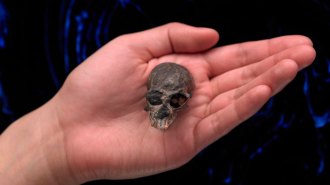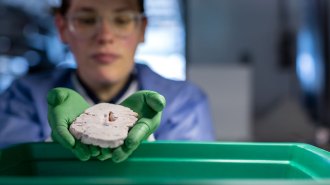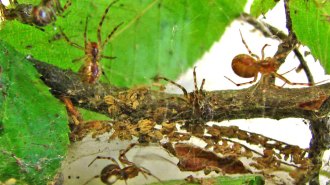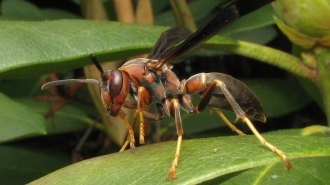All Stories
-
 Health & Medicine
Health & MedicineHigh blood pressure throughout middle age may increase the risk of dementia
A pattern of high blood pressure during midlife followed by high or low readings in one’s golden years is linked to dementia.
-
 Anthropology
AnthropologyA tiny skull fossil suggests primate brain areas evolved separately
Digital reconstruction of a fossilized primate skull reveals that odor and vision areas developed independently starting 20 million years ago or more.
By Bruce Bower -
 Climate
ClimateClimate change may make El Niño and La Niña less predictable
Atlantic Niñas and Niños have been fairly reliable bellwethers for severe El Niño and La Niña events in the Pacific. A warming world may change that.
-
 Neuroscience
NeuroscienceWhat human and mouse brains do and don’t have in common
A large comparison of human and mouse brain cells highlights key differences that could have implications for research on depression or Alzheimer’s.
-
 Physics
PhysicsQuantum physicists have teleported ‘qutrits’ for the first time
The technique could be useful for creating a future quantum internet.
-
 Animals
AnimalsWhy one biologist chases hurricanes to study spider evolution
For more rigorous spider data, Jonathan Pruitt rushes into the paths of hurricanes.
By Susan Milius -

Welcome to the new Science News website
The Science News website has a new design on an entirely new publishing platform in an effort to give readers a much better experience.
By Nancy Shute and Kate Travis -
 Humans
HumansIndia’s Skeleton Lake contains the bones of mysterious European migrants
Not all of the hundreds of skeletons found at a north Indian lake are from the same place or period. What killed any of these people is still unknown.
By Bruce Bower -
 Life
LifeBig and bold wasp queens may create more successful colonies
A paper wasp queen’s personality and body size could help predict whether the nest she has founded will thrive.
-
 Neuroscience
NeuroscienceImaging scans show where symbols turn to letters in the brain
Scientists watched brain activity in a region where reading takes root, and saw a hierarchy of areas that give symbols both sound and meaning.
-
 Life
LifeElectrodes show a glimpse of memories emerging in a brain
Nerve cells in an important memory center in the brain sync their firing and create fast ripples of activity seconds before a recollection resurfaces.
-
 Earth
EarthClimate misinformation may be thriving on YouTube, a social scientist warns
Analyzing 200 climate-related videos on YouTube shows that a majority challenge widely accepted views about climate change and climate engineering.
By Sujata Gupta